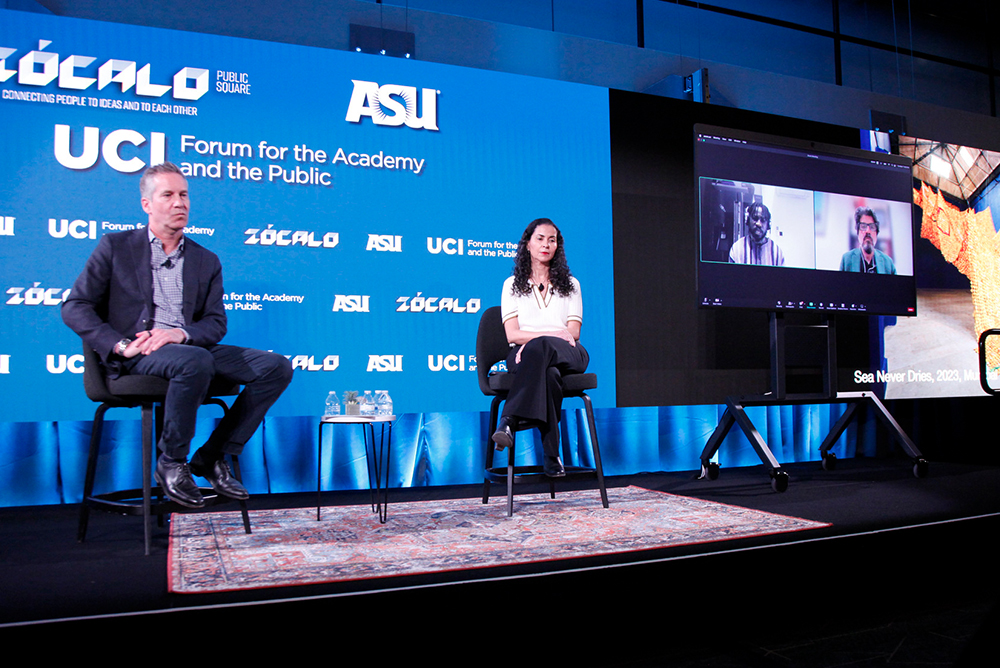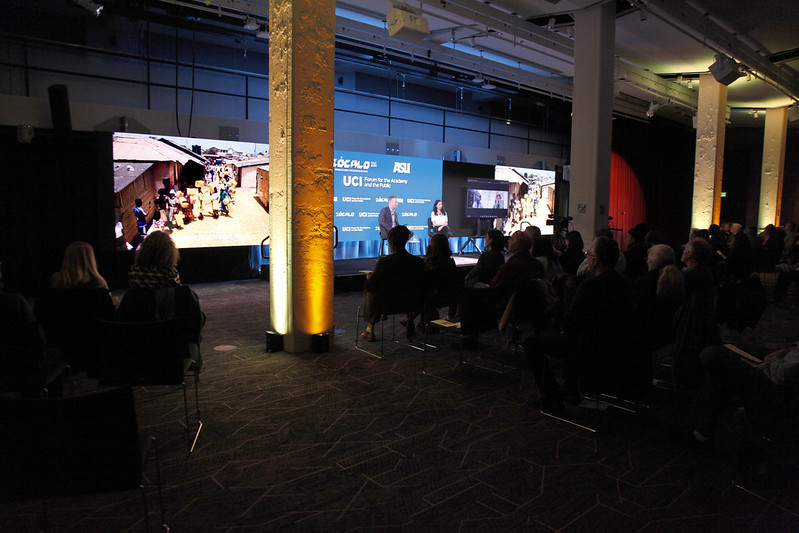
From left to right: Kal Raustiala, Laila Lalami, Serge Attukwei Clottey, and Pankaj Mishra.
The other day, the novelist and essayist Pankaj Mishra decided to change the navigation voice on his Google Maps settings from English (Great Britain) to English (India). A friend joked that he was “decolonizing Google Maps.”
Mishra recounted the anecdote during last night’s Zócalo/UCI Forum for the Academy and the Public event, “Can Decolonization Explain Everything?”
Today, from fashion to the academic syllabus, the effects of the process of decolonization are everywhere. And while decolonization may not explain everything, the panelists agreed that the work—which is political, economic, and intellectual in nature—is an integral part of the story of now.
“Many people in this country here don’t fully appreciate the significance of the colonial experience and the process of decolonization as a political revolution, as a revolution of racial justice, as an economic revolution, and as something that continues to reverberate in the 21st century,” said Kal Raustiala, director of the UCLA Burkle Center, who served as moderator of the conversation.
When we think of decolonization, we think of it as beginning in the 20th century, as peoples of Asia and Africa sought to regain sovereignty from Western imperial powers, Mishra explained. “These were nations that liberated themselves after extremely long, hard-fought battles with Western European powers, by which I mean mostly France and the United Kingdom and to a certain extent Belgium and Holland.”
Now, some 60 to 70 years later, he said, you can see how countries that have been the most “empowered as part of this process,” like India and China, have become “more and more assertive internationally.” This shows up even in Russia’s war in Ukraine, he pointed out. One reason why much of the world outside the West is not condemning Russia “has at least partly to do with the fact that the Soviet Union was supporting the process of decolonization when Western powers were resisting it,” he said. “These memories do count.”
Panelist Laila Lalami, a novelist who was born and raised in Morocco—which was a French colony from 1912 to 1956—spoke about the long process of decolonization, one that affects entire generations even if those generations have never lived in a colony.
“All stories we grew up with were all driving to the same point: that we were supposed to yield,” she said. For her grandmother’s generation, it was a story of physical compliance. She recounted to Lalami how she was walking down the street carrying her baby, who was lighter-skinned than her, when a French woman stopped them and accused her of stealing the baby. “This embodied colonial thinking,” Lalami said, “this attitude where you can just help yourself to another baby—violate a person’s physical integrity.” For her father’s generation, it was a story of economic compliance. Working for French bosses, he always felt like he was being passed over for promotions. And for Lalami’s generation, it’s a story of cultural compliance. As a child seeking books, the ones available to her in Morocco were predominantly in French. “Much of my early exposure to literature was in a colonial context even though I was born and raised in a completely independent country,” she said.
Artist Serge Attukwei Clottey, who works primarily with found materials from his hometown, Accra, Ghana, shared several of his projects with the audience, including “Yellow Brick Road” (2018), “Sea Never Dries” (2023), “Tribe and Tribulation” (2022), and “Gold Falls” (2022).
“I believe that decolonization can be very practical within the immediate space. Because I follow the mantra: Think global, act local,” Clottey said.
Audience questions relayed in person and via a live YouTube chat asked the panelists to consider questions around the nature of American empire, human colonization of Mars, and whether the British Commonwealth—a “meaningless institution,” Mishra said—provides an easier exit from empire.
The last question of the night asked the panelists to consider the language of decolonization—is the term still centering colonizers? Is Indigenizing the same movement, or something further?
Clottey discussed language itself: “Power relationships are tricky. I think that Africa still feels very much like we don’t have control.” We spend so much money to go to the U.K. to speak English, he said.
Lalami reflected on the fact that, throughout the panel, she was speaking about Morocco as a former colony of France, but Morocco itself was a country with Indigenous people before the arrival of Arabs in the 7th century. “The Indigenous people and the Arabs have intermarried so most Moroccans are both Amazigh and Arab but it’s only very recently that things like the language rights of Indigenous people in Morocco have been recognized. Finally, you can walk down the street and actually see signs that are in Tamazight, and Arabic, and French.”
But this, she added, only started because of Amazigh activists. “So I agree, it’s interesting how we can be talking about these processes and inadvertently framing them in ways that continue to center the person holding the power.”





Send A Letter To the Editors